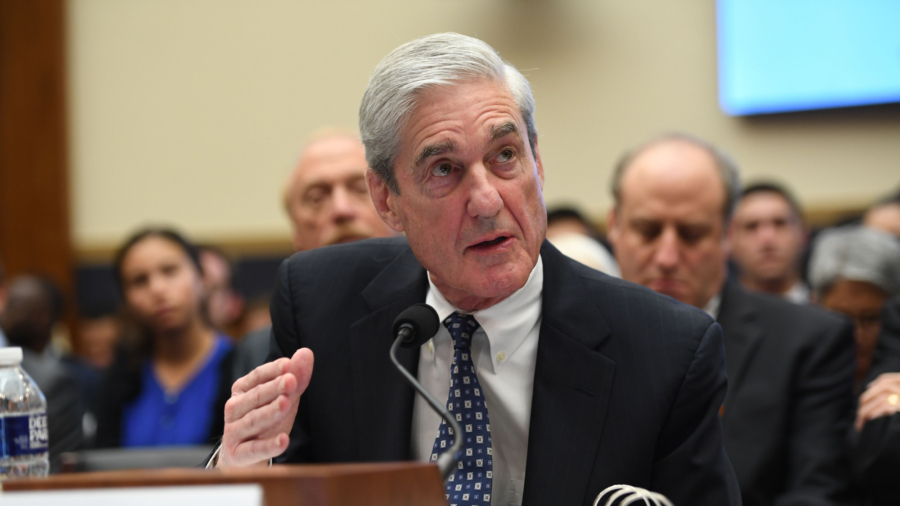Former special counsel Robert Mueller claimed that collusion and conspiracy were not synonymous before reading the report he submitted to the Department of Justice and switching his answer.
Mueller was testifying on Capitol Hill on July 24.
“Collusion is not a specific offence or a term of art in the federal criminal law. Conspiracy is,” Rep. Doug Collins (D-Ga.) said, prompting a “yes,” by Mueller as he continued.
“In the colloquial context—known public context—collusion and conspiracy essentially synonymous terms. Correct?”
“No,” Mueller responded.

Collins then cited Mueller’s own report that he submitted earlier this year.
“If no, on page 180 of Volume I of your report you wrote, ‘as defined in legal dictionaries, collusion is largely synonymous with conspiracy as that crime is set forth in the general federal conspiracy statute,'” Collins said.
“You said at your May 29 press conference and here today that you choose your words carefully. Are you sitting here today and testifying something different than what your report states?”
“What I’m asking is,” Mueller responded, “if you can give me the citation, I can look at the citation and evaluate whether it is actually.”
“Let me just clarify. … I just stated your report back to you, and you said that collusion and conspiracy were not synonymous terms, and your answer was ‘no,'” Collins replied, prompting a “yes” from Mueller.
This exchange between @RepDougCollins and Mueller is something else. The ranking member asks Mueller about whether collusion and conspiracy are synonymous terms.
Mueller initially contradicts his own report before eventually siding with it.
Video: CSPAN pic.twitter.com/O1hf5gaHjv
— Nate Madden (@NateOnTheHill) July 24, 2019
He wondered whether Mueller was contradicting himself. “Not when I read it,” Mueller said.
“So you change your answer to ‘yes,’ then?” Collins asked.
“No, if you look at the language…” Mueller started before trailing off.
“I’m reading your report, sir. It’s a yes or no answer,” Collins said.
“Page 180?” Mueller asked, before adding: “I’ll leave it with the report.”
“So you’re changing your answer?” Collins asked. “Yes,” Mueller replied.

Mueller wasn’t expected to testify about the report after stating in his press conference in May that he didn’t want to and desired to exit the public arena.
“There has been discussion about an appearance before Congress. Any testimony from this office would not go beyond our report. It contains our findings and analysis, and the reasons for the decisions we made. We chose those words carefully, and the work speaks for itself,” he said.

Collins on Wednesday wrote: “After an extended, unhampered investigation, today marks an end to Mueller’s involvement in an investigation that closed in April. The burden of proof for accusations that remain unproven is extremely high—especially in light of the special counsel’s thoroughness.”
“Russia meddled in the 2016 election. The president did not conspire with Russians. Nothing we hear today will change those facts. But one element of this story remains: the beginnings of the FBI investigation into the president,” he added.

